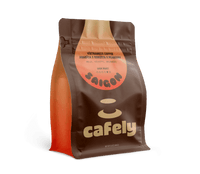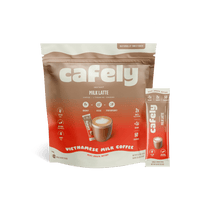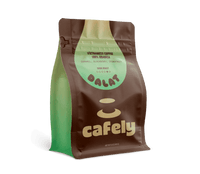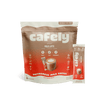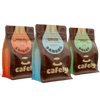Nearly 1 in 5 adults in the US report experiencing symptoms of depression — but medication isn't the only path to feeling better. [1]
Mood dips are part of being human, and sometimes all it takes is a small shift to feel a little lighter. From food to movement to simple human connection, there are everyday tools that can help you reset — naturally.
⚡ Upgrade your morning coffee with VC2 — functional fuel for your brain and mood.
1. Limit Refined Sugars & Carbs
Sugar highs often lead to mood lows. [3]
Foods with lots of added sugar or refined carbs cause blood sugar spikes, which are followed by sharp drops — and that can make you irritable, sluggish, or anxious. Stick with whole grains and balanced snacks when possible.
2. Eat Mood-Boosting Vegetables
Certain vegetables go beyond good nutrition — they actively support mental health.
Spinach, onions, bell peppers, carrots, and legumes are packed with B vitamins, vitamin C, and antioxidants, which help regulate mood-related brain chemicals and reduce inflammation tied to depression. [4]
3. Take a Walk
A short walk outdoors can be a natural mood reset.
Physical activity boosts endorphins, while time in nature lowers stress hormones and improves overall well-being. [5] Even just 10–15 minutes in green space can lift your spirits.
4. Sip a Comforting Cup of Coffee or Tea

Warm beverages offer comfort beyond caffeine.
A well-crafted cup of Vietnamese coffee or a calming herbal tea like chamomile can soothe the senses and provide a mindful moment — especially when sipped slowly and intentionally. Add a dash of cinnamon or nut milk for extra feel-good flavor.
☕ Try VC2 for a calmer kind of coffee buzz — packed with adaptogens for stress support.
5. Practice Deep Breathing or Guided Breathwork
When you’re feeling anxious, your breathing gets shallow — and your brain feels it.
Slow, deep breaths activate the parasympathetic nervous system, telling your body it’s safe to relax. [6]
Try the 4-7-8 technique: inhale for 4 seconds, hold for 7, and exhale for 8.
6. Eat Foods High in Omega-3s
Your brain is made mostly of fat — and it needs the right kind.
Fatty fish like salmon, mackerel, and sardines are rich in omega-3 fatty acids, which support brain function and may reduce symptoms of anxiety and depression by lowering inflammation. [7]
7. Limit Screen Time Before Bed
Too much screen time — especially at night — disrupts melatonin production, which affects how well you sleep. Poor sleep = poor mood.
Try shutting down phones, laptops, and TVs at least an hour before bed, and opt for a book or relaxing music instead.
8. Engage in Random Acts of Kindness
Helping someone else is one of the fastest ways to feel better yourself.
Small acts — like complimenting a stranger, paying for someone’s coffee, or sending a thoughtful message — release oxytocin and dopamine, chemicals linked to happiness and emotional bonding.
9. Listen to Uplifting Music
Music has a direct line to your brain’s reward center.
Listening to your favorite upbeat playlist can lower cortisol, ease anxiety, and improve emotional balance. Bonus points for dancing along — it adds movement to the mix.
10. Practice Self-Compassion
Talk to yourself the way you’d talk to a friend having a rough day.
Self-compassion, whether through positive self-talk, writing kind notes to yourself, or even a quick self-hug, helps lower stress and builds emotional resilience over time.
11. Spend Time With Loved Ones
Humans are social creatures — and connection is essential for mood.
Even a short conversation with someone you trust can increase oxytocin, reduce loneliness, and help shift negative thought loops. Text a friend, call a sibling, or sit down for coffee with someone who gets you.
12. Smile (Even If You Don’t Feel Like It)
Smiling — even when it’s forced — sends a message to your brain that things are okay.
It triggers the release of dopamine and serotonin, two neurotransmitters that improve mood and lower stress. [2] Try it while looking in the mirror — it might feel silly, but it works.
13. Do Something Creative
Creative expression gives emotions somewhere to go.
Whether it’s writing, sketching, baking, or playing guitar, engaging your imagination can light up reward pathways in the brain, offering both distraction and a sense of accomplishment.
14. Practice Gratitude
Gratitude helps shift your focus from what’s wrong to what’s right.
Write down three small things you’re thankful for every day. Over time, this habit rewires the brain to notice positive experiences, which can lead to better mental well-being and more optimism.
15. Try Aromatherapy

Certain scents can calm the nervous system and improve mood almost instantly.
Lavender, citrus, peppermint, and eucalyptus have all been shown to reduce anxiety and lift mood when used in essential oil diffusers, sprays, or roll-ons. [8]
Top Natural Supplements & Adaptogens for Mood Support
Alongside lifestyle changes, certain natural supplements and adaptogens may help balance your mood, reduce stress, and support mental clarity. Many of these work by influencing neurotransmitters, calming the nervous system, or supporting brain health.
Here are ten options — plus how to take them safely.
1. Ashwagandha
Ashwagandha is one of the most popular adaptogens for stress relief. [9] It helps lower cortisol levels, the body’s main stress hormone, which in turn may ease anxiety and mood swings.
- Best for: Stress-related fatigue, mood dips, and irritability
- Typical dose: 300–600 mg per day (standardized extract)
- Safety note: Generally safe short-term, but not recommended during pregnancy
2. Rhodiola Rosea

This adaptogenic herb supports mental stamina, reduces fatigue, and may improve mood, especially during periods of pressure or burnout. [10] It works by influencing serotonin and dopamine pathways.
- Best for: Burnout, low motivation, and emotional exhaustion
- Typical dose: 200–400 mg per day (standardized to 3% rosavins)
- Safety note: Take early in the day — high doses can disrupt sleep
3. Holy Basil (Tulsi)
Holy Basil is a calming adaptogen that supports adrenal health and helps reduce the effects of chronic stress. [11] It’s often used to balance mood, ease anxious thoughts, and improve emotional resilience.
- Best for: Chronic stress, overwhelm, and restlessness
- Typical dose: 300–600 mg per day (capsule), or 1–2 cups of tulsi tea
- Safety note: Avoid if pregnant or breastfeeding
4. St. John’s Wort
This flowering herb has been studied for its effects on mild to moderate depression. [12] It appears to work by increasing levels of serotonin, dopamine, and norepinephrine.
- Best for: Mild depressive symptoms, low mood
- Typical dose: 300 mg, 3 times daily (standardized to 0.3% hypericin)
- Safety note:Interacts with many medications, including birth control and antidepressants — always consult your doctor first
5. SAM-e (S-Adenosylmethionine)
SAM-e is a compound found naturally in the body that helps regulate mood-related neurotransmitters. [13] It’s widely used in Europe as a natural treatment for depression.
- Best for: Low motivation, persistent sadness, mood imbalance
- Typical dose: 400–1,600 mg daily, often split into two doses
- Safety note: Can trigger manic symptoms in people with bipolar disorder — don’t self-prescribe if you have a mental health diagnosis
6. Omega-3 Fatty Acids (EPA/DHA)
Omega-3s are essential fats that support brain function, reduce inflammation, and may help improve symptoms of depression — especially EPA. [7]
- Best for: Brain fog, mood swings, and emotional regulation
- Typical dose: 1,000–2,000 mg daily (with at least 60% EPA)
- Safety note: Choose third-party tested brands to avoid contaminants like mercury
7. Vitamin D
Vitamin D plays a major role in mood regulation and immune support. Low levels are common, especially during winter months, and have been linked to seasonal affective disorder (SAD) and fatigue. [14]
- Best for: Winter blues, low energy, irritability
- Typical dose: 1,000–2,000 IU per day (or as recommended after a blood test)
- Safety note: Too much vitamin D can cause toxicity — test your levels before megadosing
8. Magnesium
Magnesium helps calm the nervous system and is involved in over 300 bodily processes, including mood regulation. Low magnesium levels are linked to anxiety and depression symptoms. [15]
- Best for: Anxiety, tension, sleep issues
- Typical dose: 200–400 mg per day (look for magnesium glycinate or citrate)
- Safety note: Too much magnesium (especially magnesium oxide) may cause diarrhea
9. L-Theanine
Found naturally in green tea, L-theanine promotes alpha brain waves — the same ones linked to relaxation and focused calm. It helps reduce stress without drowsiness, making it great for daytime use.
- Best for: Racing thoughts, nervous energy, afternoon crashes
- Typical dose: 100–200 mg per day, often paired with caffeine
- Safety note: Generally very safe, even at higher doses
10. B Vitamins (B1, B2, B3, B6, B9, B12)

The B-complex group is essential for converting food into energy and supporting the nervous system. [16] Deficiencies in B6, B9 (folate), and B12 are especially linked to low mood and brain fog.
- Best for: Mental fatigue, low energy, mood imbalance
- Typical dose: Daily B-complex supplement or targeted doses as advised by a doctor
- Safety note: Look for “methylated” forms (like methylfolate or methylcobalamin) for better absorption
Quote: Important Reminder: While many of these supplements can support mental wellness, they’re not a replacement for therapy or medical care. If you’re struggling with persistent low mood, consult a healthcare provider — especially before combining supplements or if you’re on medication.
Lifestyle Tips for Boosting Mood Daily
You don’t need a perfect routine to feel better — just a few small, consistent habits that support your brain and body.
Below are simple, natural ways to lift your mood from the inside out. No pressure to do them all at once — even one change can help.
1. Move Your Body Every Day
Physical activity doesn’t just build strength — it helps regulate mood by releasing endorphins, the body’s natural feel-good chemicals. Even light movement can make a difference. [5]
Try:
- Walking outdoors
- Dancing in your living room
- Stretching between tasks
- A 10-minute yoga or bodyweight routine
The key is consistency, not intensity. Movement helps reduce stress hormones, improves sleep, and boosts self-esteem — all of which are tightly linked to emotional well-being.
2. Get Daily Sunlight Exposure
Sunlight triggers serotonin production, a neurotransmitter that helps stabilize mood, promote calm, and increase focus. Lack of sunlight, especially in winter, is linked to seasonal affective disorder (SAD). [14]
Aim for:
- 15–30 minutes of natural light per day, especially in the morning
- Sitting near a window if you work indoors
- Using a light therapy lamp during dark seasons
Even a short break outside during lunch can give your mood a noticeable lift.
3. Eat More Mood-Friendly Foods
What you eat affects how you feel — both physically and emotionally. A nutrient-dense diet helps your brain make the chemicals it needs for stable mood and energy.
Focus on:
- Omega-3-rich foods: salmon, flaxseeds, walnuts
- Whole foods: fruits, vegetables, lean proteins, whole grains
- Fermented foods: yogurt, kefir, kimchi, miso — these support gut health, which is tied to mental health via the gut-brain axis
Avoid:
- Ultra-processed snacks
- Sugary drinks and refined carbs
- Heavy reliance on caffeine (especially in the afternoon)
4. Practice Journaling
Writing down things you’re thankful for helps shift focus away from stress and toward what’s going right.
How to start:
- List 3 things you’re grateful for every morning or evening
- Use journaling to get thoughts out of your head and onto paper
- Try questions like: “What made me smile today?” or “One small win this week?”
You don’t need to be a writer — just be real and consistent.
5. Try Mindfulness or Meditation
Mindfulness means being present in the moment — and research shows it reduces rumination, improves self-awareness, and helps regulate emotions.
Even 5–10 minutes per day can lead to changes in brain areas tied to attention and mood.
Ways to practice:
- Use a meditation app
- Try deep breathing or body scans
- Focus on one task at a time (like sipping your hot coffee or folding laundry)
If sitting still feels hard, walking meditations or mindful stretching count too.
6. Cut Back on Alcohol and Sugar
Both alcohol and sugar may offer short-term relief — but in the long run, they can destabilize mood and worsen mental health symptoms. [17]
Why it matters:
- Sugar causes spikes and crashes in blood glucose, which can trigger irritability and fatigue
- Alcohol disrupts sleep, depletes nutrients, and can increase anxiety the next day
Try substituting with:
- Sparkling water with lemon
- Herbal teas
- Naturally sweet snacks like fruit with nut butter
If you're a coffee lover, there is a natural sugarless way to sweeten your coffee, too.
Long-Term Changes That Rebuild Mood Stability

Building emotional resilience is a process. The habits below create structure, support, and self-awareness — the building blocks of lasting mood stability.
1. Build Consistent Routines
Your brain loves patterns. Regular wake-up times, meals, and bedtime help regulate hormones like melatonin and cortisol, which directly impact mood and energy.
Start small:
- Wake up and go to bed at the same time each day
- Set regular meal times to stabilize blood sugar
- Create a calming wind-down routine at night (no screens, dim lights, herbal tea)
Structure creates predictability — which lowers stress and builds calm.
2. Prioritize Sleep Hygiene
Poor sleep affects nearly every part of mental health. [18] It lowers frustration tolerance, increases emotional reactivity, and makes it harder to focus or feel motivated.
Tips for better sleep:
- Avoid screens 1 hour before bed
- Keep your room cool, dark, and quiet
- Cut caffeine after 2 PM
- Try magnesium, chamomile tea, or guided meditations if you struggle to fall asleep.
Aim for 7–9 hours per night, and listen to your body’s needs.
3. Stay Socially Connected
You don’t need dozens of friends — but you do need meaningful relationships. Talking to someone who understands you reduces feelings of loneliness and helps regulate emotions.
Try:
- Scheduling regular calls or coffee dates
- Joining a local group or online community
- Making time for shared activities like cooking, gaming, or walks
Quality matters more than quantity. Being seen and heard can dramatically boost mental health.
4. Volunteer or Explore Creative Hobbies
Helping others and expressing yourself both provide a sense of purpose, which is a powerful antidote to low mood.
Volunteering has been shown to:
- Lower depression symptoms
- Increase life satisfaction
- Improve self-worth
Creative hobbies like drawing, music, or gardening engage the brain in new ways — providing both stimulation and relaxation.
5. Set Small, Achievable Goals
Progress creates momentum. Set goals that are realistic and rewarding, even if they’re tiny.
Try:
- Making your bed every morning
- Drinking a full glass of water before coffee
- Walking 10 minutes daily
- Crossing off just one task on your to-do list
Small wins build confidence and provide structure — both helpful when mood dips make bigger goals feel overwhelming.
Common Causes of Low Mood (Beyond Emotions)
Sometimes mood changes have biological roots that need attention. If your symptoms aren’t improving with lifestyle changes, consider these common culprits.
1. Nutrient Deficiencies
Low levels of vitamin B12, iron, omega-3s, and vitamin D can all contribute to fatigue, irritability, and depression. [19]
If you’re constantly drained, consider asking your doctor for bloodwork to check key nutrient levels.
2. Thyroid or Hormonal Imbalances
Underactive thyroid (hypothyroidism), adrenal fatigue, and hormonal shifts (like PMS or menopause) can all affect mood. [20]
Look out for:
- Unexplained weight changes
- Hair thinning
- Sensitivity to cold
- Mood swings or anxiety
These conditions are treatable, but require diagnosis through a healthcare provider.
3. Chronic Stress or Burnout
When your body stays in fight-or-flight mode too long, it runs out of resources. This can lead to exhaustion, numbness, and apathy — all common signs of burnout.
If work, caregiving, or emotional overload is your norm, it might be time to rest, reset, and seek support.
4. Poor Gut Health
The gut is sometimes called the “second brain” — and for good reason. Imbalances in gut bacteria can impact neurotransmitter production and cause inflammation linked to mood disorders. [21]
Signs include:
- Bloating
- Irregular digestion
- Food sensitivities
- Brain fog
Adding probiotic-rich foods, fiber, and reducing processed foods may help — or speak to a dietitian for support.
5. Trauma or Unresolved Emotional Patterns
Past experiences shape how we cope in the present. Unresolved trauma — whether from childhood, relationships, or major life events — can trigger low mood, anxiety, or shutdown responses.
Therapy, support groups, or trauma-informed coaching can help you explore and heal these patterns.
When to See a Doctor
Feeling low from time to time is part of being human. But if it lasts too long or disrupts your daily life, it’s time to reach out for help.
Consult a healthcare provider if:
- Your low mood lasts more than 2 weeks
- You feel hopeless, emotionally numb, or mentally “stuck”
- You’re having thoughts of self-harm or disconnection
- You’re struggling to function at work, home, or socially
- You have a family history of mental health conditions
Also, ask to rule out physical causes, like anemia, thyroid issues, or hormonal imbalances.
FAQs About Boosting Mood Naturally
1. Can you really improve mood without medication?
Yes — many people see improvements using natural strategies like diet, movement, sunlight, and supplements, especially for mild or situational low mood.
2. What’s the best natural supplement for mood?
Ashwagandha, Rhodiola Rosea, and Omega-3 fatty acids are among the most well-researched and commonly recommended.
3. How long do natural mood boosters take to work?
Most supplements take 2–4 weeks for full effects, though some — like L-theanine or magnesium — can offer benefits within hours or days.
4. Are natural supplements safer than antidepressants?
Not always. Some natural supplements cause side effects or interact with medications, so it’s important to check with your doctor.
5. What role does diet play in mood?
A big one — nutrients, gut health, and blood sugar balance all directly affect brain function and emotional regulation.
6. Can exercise really help depression?
Absolutely. Regular movement boosts endorphins, supports better sleep, and can reduce symptoms of anxiety and depression over time.
7. Is St. John’s Wort safe?
It may help with mild depression, but it interacts with many medications — including antidepressants and birth control — so use it cautiously.
8. What are the signs my mood problem is medical?
If you feel persistently low for 2+ weeks, notice changes in sleep or appetite, or have thoughts of self-harm, it’s time to seek professional help.
9. How can I stay motivated to make these changes?
Start with small steps, celebrate progress, and focus on how each habit makes you feel — not doing everything perfectly.
10. What’s the most important habit for mood?
Sleep — poor sleep disrupts emotional regulation, energy, and resilience, making every other strategy less effective.
References:
- Lee, B., Wang, Y., Carlson, S., Greenlund, K., Lu, H., Liu, Y., Croft, J., Eke, P., Town, M., & Thomas, C. (2023). National, State-Level, and County-Level Prevalence Estimates of Adults Aged ≥18 Years Self-Reporting a Lifetime Diagnosis of Depression — United States, 2020. MMWR. Morbidity and Mortality Weekly Report, 72(24).
- Graziano, M. S. A. (2022). The origin of smiling, laughing, and crying: The defensive mimic theory. Evolutionary Human Sciences, 4.
- Knüppel, A., Shipley, M. J., Llewellyn, C. H., & Brunner, E. J. (2017). Sugar intake from sweet food and beverages, common mental disorder, and depression: prospective findings from the Whitehall II study. Scientific Reports, 7(1).
- Moskwa, J., Bronikowska, M., Socha, K., & Markiewicz-Żukowska, R. (2023). Vegetable as a Source of Bioactive Compounds with Photoprotective Properties: Implication in the Aging Process. Nutrients, 15(16), 3594–3594.
- Mahindru, A., Patil, P., & Agrawal, V. (2023). Role of physical activity on mental health and well-being: A review. Cureus, 15(1).
- Bentley, T. G. K., D’Andrea-Penna, G., Rakic, M., Arce, N., LaFaille, M., Berman, R., Cooley, K., & Sprimont, P. (2023). Breathing practices for stress and anxiety reduction: Conceptual framework of implementation guidelines based on a systematic review of the published literature. Brain Sciences, 13(12).
- Dighriri, I. M., Alsubaie, A. M., Hakami, F. M., Hamithi, D. M., Alshekh, M. M., Khobrani, F. A., Dalak, F. E., Hakami, A. A., Alsueaadi, E. H., Alsaawi, L. S., Alshammari, S. F., Alqahtani, A. S., Alawi, I. A., Aljuaid, A. A., & Tawhari, M. Q. (2022). Effects of Omega-3 Polyunsaturated Fatty Acids on Brain Functions: A Systematic Review. Cureus, 14(10).
- Yoo, O., & Park, S.-A. (2023). Anxiety-Reducing Effects of Lavender Essential Oil Inhalation: A Systematic Review. Healthcare, 11(22), 2978–2978.
- Salve, J., Pate, S., Debnath, K., & Langade, D. (2019). Adaptogenic and Anxiolytic Effects of Ashwagandha Root Extract in Healthy Adults: A Double-blind, Randomized, Placebo-controlled Clinical Study. Cureus, 11(12).
- Tinsley, G. M., Jagim, A. R., Potter, G. D., Garner, D., & Galpin, A. J. (2023). Rhodiola Rosea as an Adaptogen to Enhance Exercise Performance: A Review of the Literature. British Journal of Nutrition, 1–27.
- Lopresti, A. L., Smith, S. J., Metse, A. P., & Drummond, P. D. (2022). A randomized, double-blind, placebo-controlled trial investigating the effects of an Ocimum tenuiflorum (Holy Basil) extract (HolixerTM) on stress, mood, and sleep in adults experiencing stress. Frontiers in Nutrition, 9.
- Peterson, B., & Nguyen, H. (2023, May 16). St. John’s Wort. PubMed; StatPearls Publishing.
- Baden, K. E. R., McClain, H., Craig, E., Gibson, N., Draime, J. A., & Chen, A. M. H. (2024). S-Adenosylmethionine (SAMe) for Central Nervous System Health: A Systematic Review. Nutrients, 16(18), 3148.
- Penckofer, S., Kouba, J., Byrn, M., & Estwing Ferrans, C. (2010). Vitamin D and Depression: Where is all the Sunshine? Issues in Mental Health Nursing, 31(6), 385–393.
- Kirkland, A., Sarlo, G., & Holton, K. (2018). The Role of Magnesium in Neurological Disorders. Nutrients, 10(6), 730.
- Calderón‐Ospina, C. A., & Nava‐Mesa, M. O. (2019). B Vitamins in the nervous system: Current knowledge of the biochemical modes of action and synergies of thiamine, pyridoxine, and cobalamin. CNS Neuroscience & Therapeutics, 26(1), 5–13.
- Zhang, L., Sun, H., Liu, Z., Yang, J., & Liu, Y. (2024). Association between dietary sugar intake and depression in US adults: a cross-sectional study using data from the National Health and Nutrition Examination Survey 2011–2018. BMC Psychiatry, 24(1).
- Hanson, J. A., & Huecker, M. R. (2023, June 12). Sleep Deprivation. PubMed; StatPearls Publishing.
- Zielińska, M., Łuszczki, E., & Dereń, K. (2023). Dietary Nutrient Deficiencies and Risk of Depression (Review Article 2018–2023). Nutrients, 15(11), 2433–2433.
- Gudipally, P. R., & Sharma, G. K. (2023, July 17). Premenstrual Syndrome. PubMed; StatPearls Publishing.
- Dicks, L. M. T. (2022). Gut Bacteria and Neurotransmitters. Microorganisms, 10(9), 1838.
